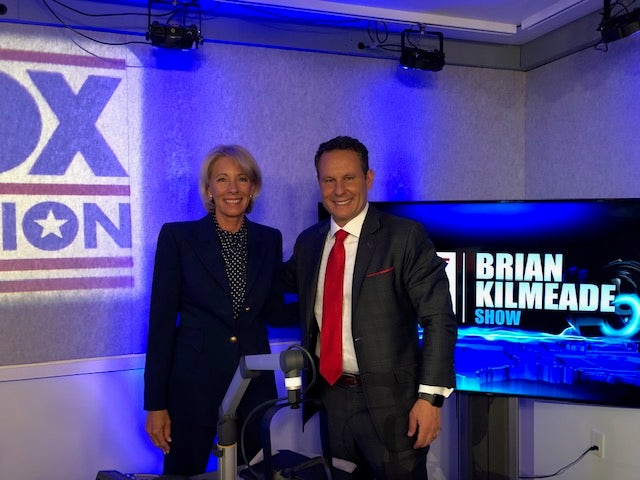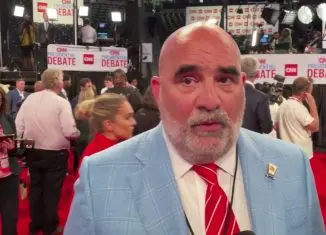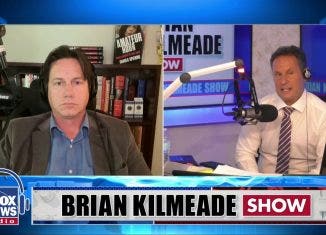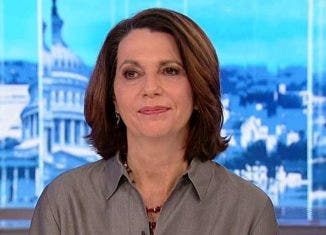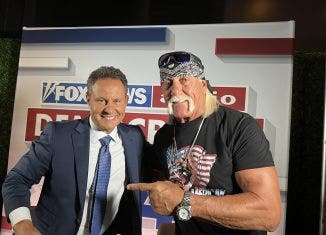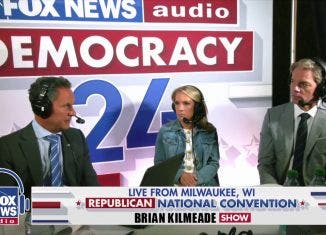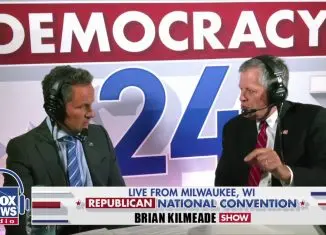Secretary of Education Betsy DeVos spoke to Brian Kilmeade and took exception to former Vice President Joe Biden saying we need to end the “Trump-DeVoss” education agenda. She also discussed the College Admissions Scandal and the challenge for students and teachers dealing with illegal immigrants in public schools.
Watch here:
Secretary of Education Betsy DeVos spoke with Brian Kilmeade about students accumulating over a trillion dollars in school debt, the need to focus on returning school choice to parents and the states and increasing access to more technical and vocational education in schools in high school.
Watch here:
Full transcript
BRIAN KILMEADE, FOX RADIO HOST: But it’s my privilege to have in our studio the 11th U.S. Secretary of Education, Betsy DeVos. Ms. Secretary, thanks so much for coming in.
BETSY DEVOS, UNITES STATES SECRETARY OF EDUCATION: Well, thanks for the opportunity Brian.
KILMEADE: There’s never a slow day with your administration and in this country. Is it amazing to you?
DEVOS: That’s right. No, it is. And I think what a lot of people miss is how much is getting done beneath all of the noise and all of the commotion.
KILMEADE: Jared Kushner said something last week, he said, the best thing to happen to us was the Russia investigation. And I said, why? Because everyone’s attention was on the Russia investigation and they were able to get rules and regulations rolled back and things passed to get the economy going. I wouldn’t say the Russia investigation has been good, but I understand his thought process.
DEVOS: Well, I know at the Department of Education we have been working hard on rolling back a lot of the extensive overreach of the previous administration and we’ve been able to do so, I think, at a rate that people are surprised about.
KILMEADE: So, give me an idea of what types of things you’ve one over the last two years.
DEVOS: Well, there’s been a number of regulations that on higher ed. that have been really big overreaches around borrower defense to repayment, gainful employment, all relating to a tax on higher ed institutions based on how they’re organized, based on their tax status. And, you know, right now we have $1.5 trillion in student loan debt.
That number continues to grow every single day, every single year, and we have students who are not able to pay their debt back. But taking – going into courses and taking classes that aren’t necessarily relevant to them today, a mismatch between what’s going on in higher education and today’s opportunities in the economy, 7 million plus jobs going unfilled that need some kind of education beyond high school but not necessarily four years.
So a lot of the regulatory environment and framework that we’ve been handed, we have to modernize and change so that students can actually access opportunities today that are plentiful and that –
KILMEADE: Right.
DEVOS: – will set them up for lifelong learning and touching back into education as they need to.
KILMEADE: You have some big announcements today, but just one what you just brought up, I am not hand but I was – infinitely beneficial for me to take woodshop. I remember I took basic mechanics. I always watch – my dad always had them. My younger brother was fantastic. It was like the hardest thing I ever took outside physics, but I had to take it. But the shops, the metal shop, the machine shop, the auto repair shop – that stuff is gone from schools. I didn’t realize it. Once I left, I just thought it would still be there. What happened?
DEVOS: Well, it’s starting to come back because people realize that there are great opportunities and great opportunities and great careers to be had in a whole variety of what was considered career and technical or vocational education. I’ve visited a number of these high schools where students are coming from all over a region and are taking apprenticeship and intership classes during their high school years and are going out. I was just at a signing day in Butler – at Butler Tech in Cleveland, Tennessee – I’m sorry – in Ohio a couple weeks ago, and the students that day were signing with employers.
For them the moment they graduated they had a full-time job in a really meaningful, high-paying career with opportunity to continue their own education beyond. More and more employers are realizing that they have got to get involved with education earlier on. For too long there have been silos built between employers and business and the education world, and today it – we have got to break those silos down so that students can access these opportunities much earlier on starting in high school and –
KILMEADE: Right.
DEVOS: – with relevant to date subjects that are going to afford them those opportunities.
KILMEADE: So you’re approaching this job as how can I practically help the country. You’re not getting involved in some type of inside Washington approach to this job. Am I correct?
DEVOS: No. In fact I think the Department of Education has long overstepped its bounds and has gotten much too involved. Only $0.09 on a dollar comes from the federal government for all of education, and yet the presence of the federal government in education has been a very large footprint. We are trying to undo a lot of that, to roll that back to allow the states and local communities the control to be able to decide what’s best in their communities for the students that they have.
KILMEADE: And be honest, Mrs. Secretary, as you travel the country, do you look at some districts and you think to yourself, “they need help,” and others is these people are leading us? So what do you do to those who need the help?
DEVOS: Well absolutely. What you do is you highlight areas and highlight places where people are doing a great job of offering different opportunities and relevant opportunities for students. And you point out where it’s not going so well and you try to encourage adults to take responsibility for making the changes that are necessary. One of the important proposals that we have at the federal level is to establish a tax credit for K12 education that states could decide to participate in, but when they did so, they could create programs at the state level to offer parents and students more choices for their kid’s K12 education.
Or if a student wanted to go to a charter school, if a student wanted to go to a private faith-based school, if a student wanted to go into an apprenticeship program or a duel enrollment opportunity, there are countless opportunities and it would be only left to the states’ imagination how they could create new opportunities for students to find the right fit for their K12 education.
KILMEADE: And by the way, we’re following two stories. William Barr has left his home, we watched his SUV leave, he’s in Washington getting set to testify, and we’re also getting the latest from Krach’s (ph) Venezuela, where it mayday and there’s thousands of people in the streets already.
We spoke to John Bolton, the national security advisor about an hour ago on TV; I’ll bring you some of the highlights. But let me ask you something, the voucher money, so if I’m lower to middle class, the upper class don’t have a problem writing a check to go to a private school, we know that. So is your image — if you’re in a suburban — people only think urban in charter schools, but if you’re in a middle to lower middle class and you say, I’m paying you school taxes, on principle, I’m not going to pay another $7,000 at least to go to that catholic school down the street, even if by sense more than likely it’s going to be a better education. Now you’re saying apply for a voucher and if I — if I qualify, I’ll get it and what would qualify me?
DEVOS: So, I prefer to refer to them as scholarships. Scholarships can be used to take to a school or an education setting that works for you. And states that have done this well, I usually point to Florida because they have offered the greatest range of choices and flexibility for students. Parents decide what kind of school or what kind of education environment — maybe it’s a virtual online school or a combination. They can customize their kid’s educations based on accessing these scholarship funds at the state level. So that’s what we…
KILMEADE: What would be my quality (ph)? Would it be economic? Would it be academic? How would I qualify for it?
DEVOS: Well, most states decide to income test or means test scholarships offered to students, but our proposal would allow states to decide how they wanted to use those funds to advance choices for kids and give parents the opportunity to find the right fit for their kid’s education.
KILMEADE: And you also have something for teachers. When we come back, more with the secretary of education, Betsy DeVos, who’s been kind enough to come into studio this morning as we have a very busy news day. So more with the secretary of education, and after that, we welcome in Alan West, and then we’ll take your calls, 1-866-408-7669. This is the Brian Kilmeade show.
(BREAK)
KILMEADE: Secretary of Education, Betsy DeVos, is there. You didn’t even know that Joe Biden referred to yesterday.
DEVOS: I did not know that. No, I did not. I actually take a lot of issue with the things he’s said. And with regard to education, we are advocating for more freedom in education for parents and students to be able to take much more control of their education, and we’ve done the same thing for 50 or 60 years with more and more resources and expected different results and we haven’t gotten them. We have got to do something different and we’ve got to empower students and parents.
KILMEADE: Iowa in a word (ph) – we have stations in Iowa. How are you guys doing in Iowa? What was your approach there?
DEVOS: Well, I met recently with a governor and a whole bunch of people there to talk about our proposal to expand and advance choice to the states and allow states to make programs that are going to actually meet the needs of students in states today. And with – very receptive, very excited about that prospect, and we’re going to continue to work with governors and state leaders across the country. We need to gain the support in Congress for this initiative, but the support is there at the state level.
KILMEADE: So tell me what you’re doing for teachers. You have a teacher voucher program, too.
DEVOS: We have a proposal to empower teachers to make choices for their own professional development. I’ve met with hundreds of teachers across the country, and almost to a person they say, “our professional development is assigned to us or it’s – we are sort of forced into doing things that are irrelevant for our own personal development and professional development.” We proposed to do a pilot program to test out how teachers do when given the opportunity to make those decisions themselves, for them to decide how to better their own skills and –
KILMEADE: Right.
DEVOS: – to advance their own teaching skills.
KILMEADE: So, I want to go back, if I can, to higher education and you know what’s going on right now with the celebrities Lori Loughlin and other who are paying their way to get their kids, not only someone taking their SATs, but to pay their way into major universities they have no business going to.
We know there’s 50 people involved, I imagine, Secretary DeVos, it’s much greater than that. Are you planning on addressing that or is your plate full?
DEVOS: Well, we’ve taken a couple of steps to require information form those schools involved and I can’t say a whole lot about that right now, because it’s an open investigation.
KILMEADE: Would you say it’s a priority?
DEVOS: But, it is a priority and the thing is, students need to know the deal. They need to know that their opportunities and their options are going to be fair for everyone involved. It’s very clear that what has been going on in some of these schools is — I mean it’s a travesty.
KILMEADE: Were you shocked or did you know this?
DEVOS: I did not know about this. Certainly didn’t know about this specific issue, but it does not surprise me that there is the kind of gamesmanship going on and we have got to ensure, ultimately, that students have a fair playing field and a fair shot to pursue their educations.
KILMEADE: And Miss Secretary, I’m stunned that Yale and Harvard need government subsidies. And by the way, that they were getting money from the government, they were — should be if you’re going to get money, you should at least have some standards.
And your admissions got to be somewhat transparent.
To think that I’m going to be put on a sailing or soccer team when I have neither one of those skills and jump ahead of somebody that’s been almost — I see — I know valedictorians that can’t get into Ivy League schools. And yet this is going on because somebody is rich or famous.
DEVOS: Well, the reality is that education in our country is not as it should be. We are stuck in a mold of the past with millions of opportunities for great careers that students can’t access because their education has not been relevant for them. This administration is focused on opening up and encouraging and supporting all of those pathways so students have the opportunity to pursue a great future based on their passions, their desires and their initiative.
KILMEADE: OK, so you’ve talked about student voucher and student — student voucher and teacher voucher programs and you also want to get away from there’s too much — there’s too much administration not enough teachers. You have a program that would have the great teachers teaching other teachers?
DEVOS: Well, I hear from teachers also, that they don’t want to leave the classroom and yet for them to advance most often they’re pulled into administration and then they’re no longer in front of students and with students.
We propose that teachers are empowered to become mentors and to oversee residency programs so that they can — the best teachers can teach new and inexperienced teachers how to become great teachers themselves. It would allow them career advancement opportunities to be able to say in the classroom and we’ll support them as the professionals they are.
KILMEADE: I was able to ask Governor Abbott about the illegals in their classrooms. If an illegal is here, and they might be a great kid, but the get into the classroom, they get placed there, they don’t speak English, it’s killing the Texas education system, it hurts the kids that are residence of Texas, what are we doing about illegals in the classroom?
DEVOS: Well, the …
KILMEADE: By law you’ve got to teach them.
DEVOS: By law — by law they are welcomed into every K-12 classroom in America. It is a challenge for students that don’t speak English, we know that, but we know that there are also hundreds and thousands of dedicated teachers that will work with these students to help them learn the English language and to be able to grow themselves and become productive and part of this society if they’re going to be here.
KILMEADE: Yes, you would just hope they would be citizens first. The secretary of education, Betsy DeVos, made it through all of the storms. Thanks so much, great to see you in person, continue the success.
DEVOS: Great to see you, Brian, thank you. Thank you so much.

